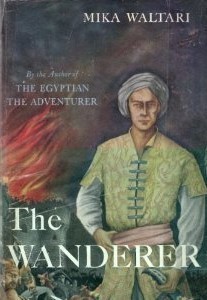
The Wanderer
Book Description
A heart beats wildly in the rhythms of ancient adventure, pulling a solitary figure across the vast landscapes of a world on the brink. As a once-mighty warrior grapples with loss and the quest for redemption, alliances blur and betrayals sting. Against a backdrop of relentless storms and mystic encounters, the wanderer must confront not only the dangers that lie ahead but the shadows of his own past. The stakes rise with each step he takes, leading to a fateful clash that could alter his destiny forever. Will he find the strength to reclaim his purpose, or will the winds of fate cast him adrift once more?
Quick Book Summary
"The Wanderer" by Mika Waltari is a moving historical novel following a lone warrior as he traverses a world fraught with political upheaval, personal anguish, and spiritual uncertainty. Stripped of his former glories, the protagonist embarks on a journey of survival and self-discovery, haunted by past betrayals yet driven by an urgent need for redemption. Waltari masterfully blends rich atmospheric detail, philosophical reflection, and gripping adventure, taking readers deep into an era of shifting alliances and mystical beliefs. As the wanderer faces hostile landscapes and enigmatic strangers, he ultimately confronts his own doubts and traumas. The story weaves themes of loss, identity, and fate, culminating in a clash that will determine both his future and his place in a rapidly changing world.
Summary of Key Ideas
Table of Contents
The Search for Redemption Amidst Loss
The story opens with the protagonist, once a celebrated warrior, now adrift and diminished by the losses he has suffered—both personal and societal. Waltari paints a vivid portrait of a man driven from his homeland, haunted by the violence and betrayals that shattered his identity. As he wanders across ancient landscapes, the hero is marked by loneliness, his every step a search for meaning in a tumultuous world. The reader is immersed in the internal struggle between resignation and hope, as the wanderer wrestles with his inability to return to his former life or reconcile his guilt.
The Weight of the Past and Memory
Throughout his journey, the wanderer encounters a wide array of characters—from would-be allies to duplicitous enemies. Each relationship reveals the fragile nature of trust in a land rife with deceit, as even moments of camaraderie are shadowed by suspicion. Old acquaintances and new companions alike test his boundaries, forcing him to reevaluate what loyalty and friendship can mean when survival so often requires self-interest. These interactions deepen his awareness of the wounds left by past betrayals, shaping his actions and fueling his drive for personal redemption.
Betrayal and the Fragility of Trust
The novel deftly explores the influence of fate and the individual's role in shaping or succumbing to it. Waltari interlaces the protagonist’s story with omens, dreams, and the mystic traditions of the era, posing existential questions about destiny. The wanderer, buffeted by events beyond his control, vacillates between acceptance of predestined misfortune and defiance, striving to carve his own path. In this tension, the book examines how people contend with forces larger than themselves and the capacity to find meaning—or revolt—within disparate developments.
Fate, Destiny, and the Role of the Individual
Mysticism and spirituality permeate the journey, as the wanderer grapples with visions, encounters with oracles, and sacred rituals that challenge his perceptions of reality. These supernatural elements serve not only to illuminate the historical period but also to reflect the protagonist’s inner transformation. Waltari uses these mystic encounters to probe questions of faith, doubt, and the search for solace in an unpredictable world. Such moments punctuate the narrative, highlighting the interplay between material survival and the transcendent.
Spirituality and Encounters with the Unknown
All threads converge as the wanderer faces a final reckoning. Driven by the lessons learned through hardship, companionship, and introspection, he must decide whether to cling to his past or forge a new identity. The climactic confrontation tests not just his physical skill but the emotional resilience cultivated throughout his odyssey. By its end, the novel offers a poignant meditation on loss, redemption, and the possibility of self-renewal—even as the winds of fate continue to howl.
Download This Summary
Get a free PDF of this summary instantly — no email required.





